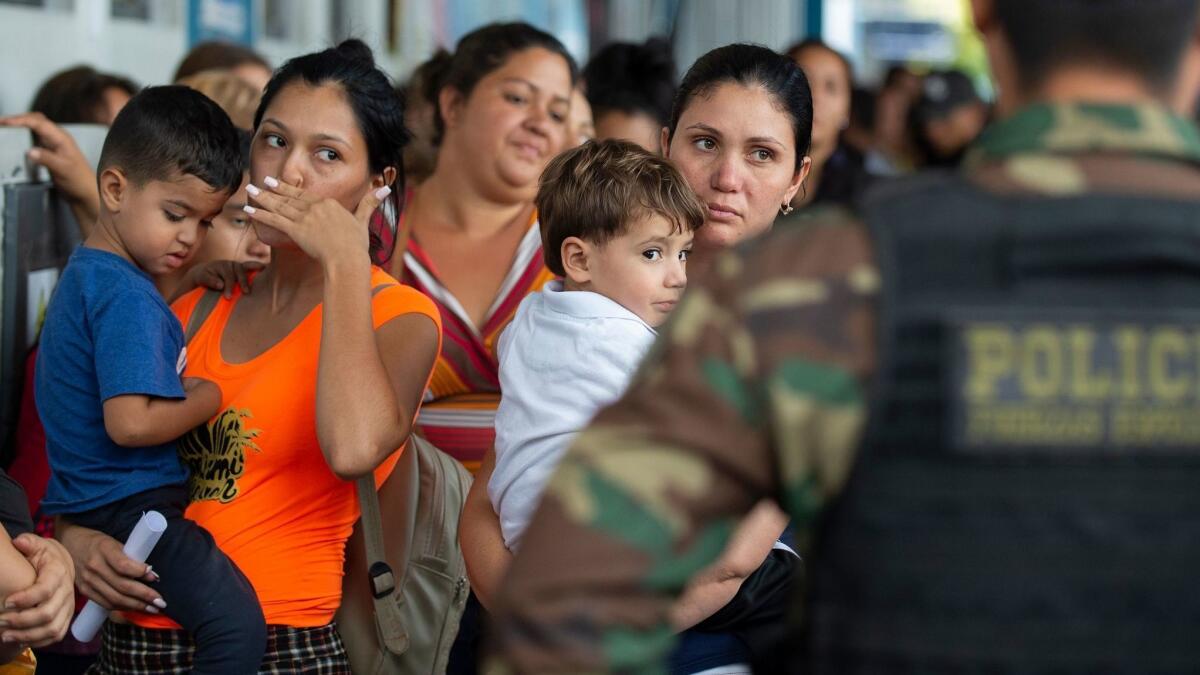Opinion: A regional refugee crisis in the Americas deserves a regional solution

- Share via
Thanks largely to the obsessions of President Trump, this country’s attention has been riveted by the tens of thousands of migrants, most of them families, moving north through Mexico in hopes of reaching a future in America.
But that migration is just part of a growing regional crisis that has people on the move not only from Guatemala, Honduras and El Salvador, but also from Venezuela — an all-but-failed state — and parts of Colombia, where there are fears of renewed violence from a resurgent separatist movement that has over the years displaced more than 7 million people within the country.
Each of these issues is problematic enough on its own, but taken in their totality they pose a growing and dire threat to regional stability.
The United Nations High Commissioner for Refugees this week renewed a call for regional talks to confront the displacement issue before it evolves into a much larger and harder-to-handle refugee crisis.
As it is, the U.S. asylum system is overwhelmed by requests for sanctuary, with some 350,000 people apprehended at the U.S.-Mexico border from March through May, a significant jump over recent years (though not all are seeking asylum). Similarly, Mexico has endured a doubling of asylum requests.
And the UNHCR estimates 4 million Venezuelans have fled their country, with most of them settling in Colombia, Peru and Chile in search of food and work. Given the unresolved battle for power between President Nicolas Maduro and Juan Guaido, the legislative leader who has declared himself president, conditions in Venezuela aren’t likely to settle any time soon.
The UNHCR has suggested a pragmatic approach of governments working together to expand capacities for dealing with refugees in the short term and, as needed, helping them integrate into new societies or reintegrate into the ones they left.
It’s neither a new problem nor a new approach — the UNHCR helped organize a meeting of American states and international organizations a decade ago to focus on regional migration issues.
Governments in the region should unite in addressing the growing migration problem.
But clearly, previous efforts have been insufficient to handle the current task.
While the Trump administration seems to think the solution to the flow is to simply stop people from crossing borders, that strategy won’t work over time.
The problem requires a regional solution, including creating an multinational infrastructure for giving aid to those who desperately need it, stabilizing civic institutions in nations with long histories of political turmoil, and building capacity to help people affected not only by political upheaval but also by recurring earthquakes, powerful hurricanes and, as we’re seeing now, crop failures and food insecurity influenced by climate change.
Enter the Fray: First takes on the news of the minute »
Of course, getting the Trump administration, which is deeply suspicious of multilateral agreements and actions, to embrace such a regional approach to problem resolution isn’t likely to happen.
But the UNHCR is right to make this call, and other governments in the region should unite in addressing the growing migration problem, even if the U.S. remains on the sidelines for now.
More to Read
A cure for the common opinion
Get thought-provoking perspectives with our weekly newsletter.
You may occasionally receive promotional content from the Los Angeles Times.










